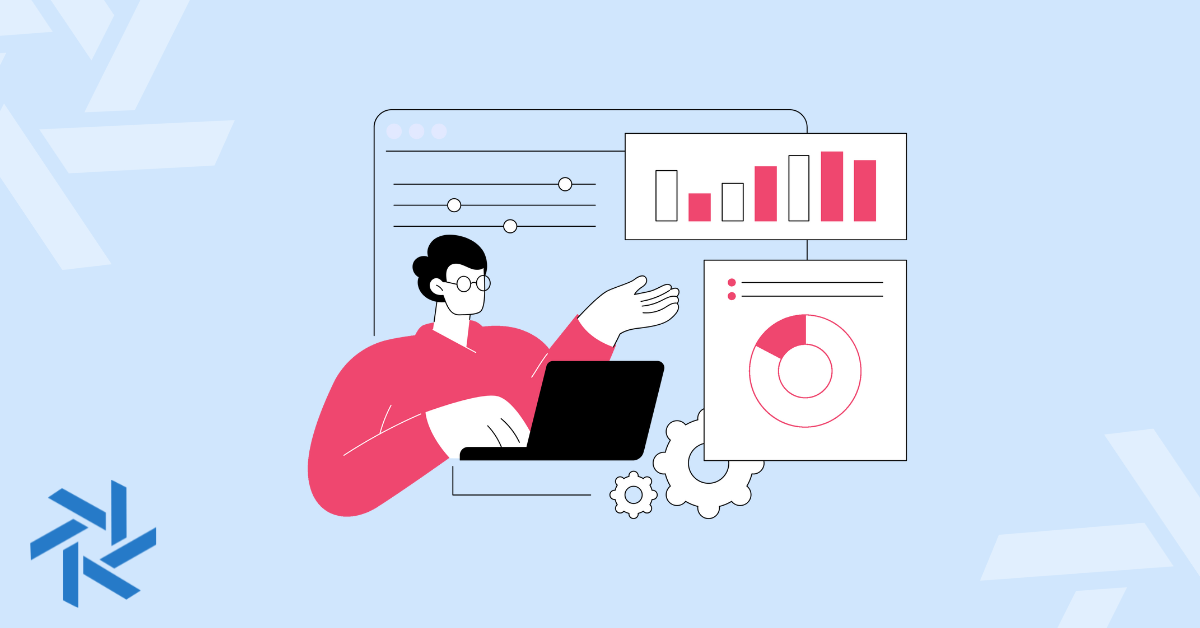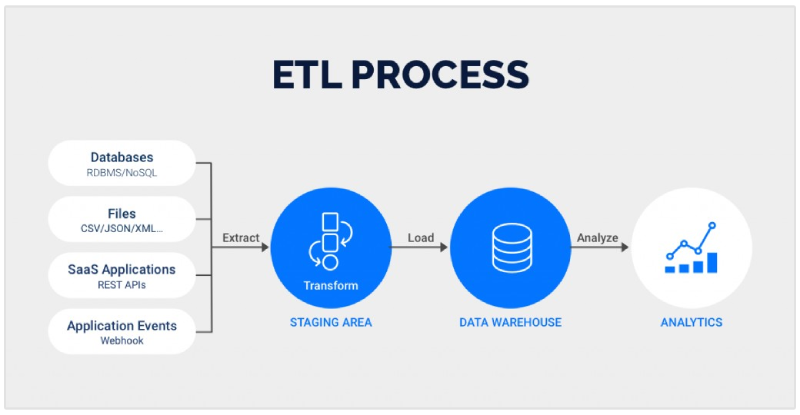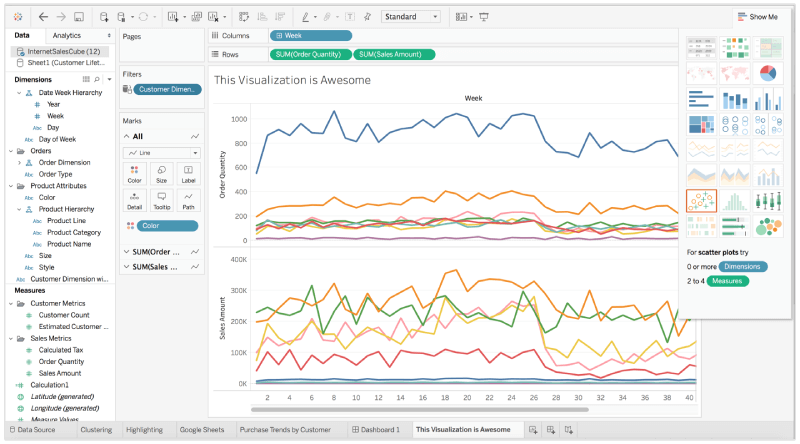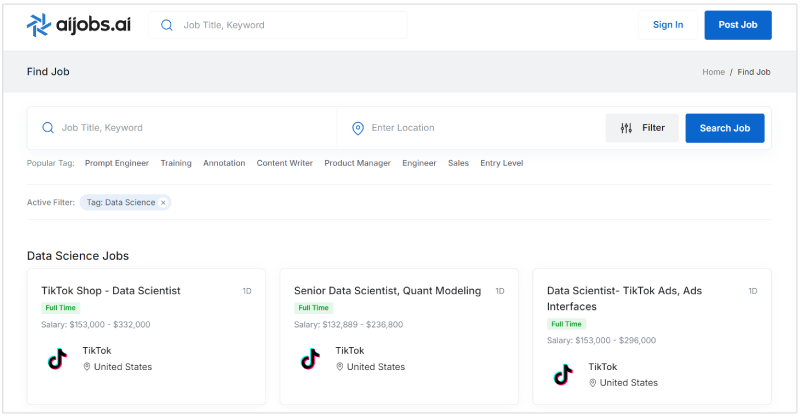Top 8 Analytics Engineer Interview Questions and How to Prepare for Interview

When preparing for an analytics engineer interview, knowing the most common analytics engineer interview questions can significantly help your confidence and readiness.
Jobs in data science should grow by 35 percent in the decade between 2022 and 2032. - US Bureau of Labor Statistics
As the demand for data-driven insights continues to grow, so does the competitive landscape for analytics roles.
For this reason, you need to be well-prepared for your interview if you want to stand out from the other candidates competing for the same role.
This blog post will explore the top 8 interview questions you’re likely to encounter, providing you with insightful answers to help you stand out. Additionally, we’ll share some essential tips to help you prepare effectively and navigate the interview process with ease.
What is an Analytics Engineer?
An analytics engineer bridges the gap between data engineering and data analysis. They are responsible for designing, building, and maintaining scalable data pipelines that convert raw data into actionable insights.
Some of the key responsibilities for an analytics engineer are:
- Developing and optimizing ETL processes to ensure data quality and integrity.
- Collaborating with data scientists and business stakeholders to understand data requirements.
- Implementing data models and ensuring they are robust and scalable.
- Utilizing SQL and other programming languages to query and manipulate data.
Types of Analytics Engineer Interview Questions
So let's take a closer look at some of the most common types of analytics engineer interview questions.

Technical Interview Questions
The technical questions are likely the most important part of an analytics engineer interview because they evaluate your technical proficiency and expertise.
Given that the role of an analytics engineer is highly technical, these questions are designed to test your understanding of data systems, coding skills, and problem-solving abilities.
They typically cover areas such as SQL queries, data modeling, ETL processes, and database management.
Mastery of these technical skills is essential, as your day-to-day responsibilities will involve complex data manipulation and engineering tasks.
Being well-prepared for these questions demonstrates that you have the foundational knowledge and practical experience required for the role.
Scenario Based Interview Questions
Scenario-based interview questions present hypothetical or real-world situations to assess how you would handle specific challenges or tasks related to the role.
These questions often require you to apply your technical skills, problem-solving abilities, and decision-making process to address issues you might encounter on the job.
A hiring manager might ask scenario-based questions to:
- Evaluate Practical Skills: They want to see how you apply your knowledge in real-world contexts and how effectively you can solve problems that arise in your day-to-day work.
- Assess Problem-Solving Abilities: These questions reveal your approach to troubleshooting and overcoming obstacles, which is critical for an analytics engineer dealing with complex data issues.
- Understand Decision-Making: They help the manager gauge your decision-making process, including how you prioritize tasks and make strategic choices under pressure.
- Test Communication and Collaboration: Often, these questions also involve explaining your thought process and solutions, which can showcase your ability to communicate effectively and work collaboratively.
General Interview Questions
General interview questions are designed to evaluate aspects of your personality, career goals, and overall fit for the company culture.
Unlike technical or scenario-based questions, these questions focus on who you are as a person and how you align with the values and objectives of the organization.
These questions might include topics such as:
- Career Goals: They explore your long-term ambitions and how this role fits into your broader career plans. This helps the hiring manager understand your motivation and whether you have a clear vision for your professional future.
- Personality Traits: Questions about your strengths, weaknesses, and work style aim to gauge your self-awareness and how you might interact with others on the team. This helps determine if you would be a good cultural and interpersonal fit for the company.
- Work-Life Balance: Discussing interests and activities outside of work provides insight into how you manage work-life balance and whether you have hobbies or passions that contribute to your well-being.
- Company Fit: These questions assess how well your values and work style align with the company's culture and mission, ensuring that you will thrive in their environment.
So now, let's take a close look at some of the commonly asked analytics engineer interview questions.
8 Analytics Engineer Interview Questions
Can you explain the ETL process and how you would optimize it for performance?
The ETL process involves extracting data from sources, transforming it into a usable format, and loading it into a data warehouse.
This question evaluates your understanding of Extract, Transform, Load (ETL) processes and your ability to enhance efficiency.

Describe your experience with data modeling. How do you ensure the models you create are scalable and maintainable?
A recruiter or hiring manager might ask this to assess your skills in developing robust data models and your approach to scalability and maintenance.
What are the key differences between SQL and NoSQL databases? When would you choose one over the other?
Recruiters ask this question to gauge your understanding of different database technologies and your ability to make informed decisions based on project requirements.
This question tests your knowledge of database technologies and your decision-making process in selecting the appropriate database type.
Can you walk me through a complex SQL query you’ve written? What was the context and outcome?
This next question evaluates your proficiency in SQL and your capability to write and explain complex queries.
These technical questions give you the opportunity to showcase your communication skills and whether you convey information in an easily understandable way.
Describe your experience with data visualization tools
This question is crucial because data visualization tools are key for presenting data insights clearly.
It assesses your familiarity with tools like Tableau or Power BI, your ability to create meaningful visualizations, and your skill in communicating complex data to stakeholders. It also shows your understanding of best practices in data presentation and your experience handling various data visualization challenges.

What are your strengths and weaknesses?
During an analytics engineer interview, recruiters often ask, “What are your strengths and weaknesses?”
This question serves several purposes:
- It helps determine if you have a realistic understanding of your abilities and areas for growth.
- Recruiters can gauge your sincerity and integrity based on how candidly you discuss your weaknesses.
- Understanding your weaknesses allows recruiters to see if you are proactive in addressing them and committed to personal development.
The best way to answer this question is to be honest. Avoid the cliché of turning a strength into a weakness (e.g., "I'm a perfectionist").
The best answers to this question sincerely explain a weakness and provide an example of how you are actively working to improve. - Swetha Amaresan
When you’re talking about your strong points, try to highlight strengths that are directly related to the analytics engineer role, such as proficiency in specific tools or excellent problem-solving skills.
Example Answer
- Strengths: “One of my strengths is my proficiency with data visualization tools like Tableau and Power BI, which allows me to effectively communicate complex data insights to stakeholders.”
- Weaknesses: “A weakness I’m addressing is my tendency to take on too many projects at once. I’m currently improving my time management skills by using project management software to prioritize tasks better.”
Where do you see yourself in 5 years?
Recruiters ask this question to gauge your career ambition and long-term goals. They want to see if your aspirations align with the company’s objectives and growth opportunities.
It also helps them assess your commitment to the role and whether you’re likely to stay and grow within the company.
Here are some tips on how to answer this analytics engineer interview question:
- Demonstrate your drive and ambition by outlining a clear and realistic career path. Highlight milestones you aim to achieve and how you plan to reach them.
- Research the company’s vision and values, and tailor your answer to show how your goals align with their objectives. This demonstrates your commitment to contributing to the company's success.
- Provide a specific yet flexible plan. Avoid vague answers and instead focus on attainable goals that reflect your career progression in the analytics field.
Why are you leaving your current job?
When answering this question, it's important that you don't "bad mouth" your current employer. It's important to approach the question with honesty and professionalism.
Here are some tips on how I'd answer this question:
- Provide a truthful reason for leaving, but frame it positively. Focus on what you're looking for in your next role rather than criticizing your current job or employer.
- Highlight how you’re seeking new challenges, opportunities for advancement, or a better fit for your skills and interests.
- Steer clear of speaking poorly about your current job, boss, or colleagues. Negativity can reflect poorly on you.
- Connect your reason for leaving with your career goals and how the new role aligns with them.
- Keep your explanation brief and to the point, focusing on the positive aspects of your job search.
Questions You Should Ask in an Analytics Engineer Interview
It's important that you come prepared with a set of your own questions.
By asking some questions of your own, it shows your interest in the role and company, indicating that you are serious about finding a good fit.
Typically, a job seeker with no questions is assumed to be either not really interested or not very bright. - Susan P. Joyce
It also allows you to gather important details about the job, team, and company culture, ensuring the role aligns with your career goals and expectations.
Additionally, it helps clarify job responsibilities, performance metrics, and career advancement opportunities, providing a clearer understanding of what will be expected of you. Thoughtful questions also build rapport with the interviewer, showcasing your critical thinking and communication skills.
Now, you don’t want to overwhelm the interviewer with a bunch of questions. They likely also have other candidates to interview or work to get to, so you don’t want to take up unnecessary time.
Typically, you should prepare 5 questions and ask 3. - Taylor Varco, PerSe Group
So here are some questions that you can ask in an analytics engineer interview:
What are the main challenges your analytics team is currently facing?
This question helps you understand the specific difficulties the team is dealing with, giving you insight into the complexities of the role and the potential obstacles you might encounter.
This question also shows your proactive approach and problem-solving mindset, as it indicates you are thinking about how you can contribute to overcoming these challenges.
Can you describe the team structure and who I would be working closely with?
This question helps you understand the hierarchy, key roles, and the collaborative nature of the team, which can be crucial for your integration and effectiveness in the role.
It also allows you to gauge how your skills and responsibilities will align with those of your potential colleagues and supervisors.
Understanding who you'll work closely with can give you a better sense of the team's culture, communication style, and how decisions are made, helping you assess if you’ll be a good fit for the team.
What are the next steps in the interview process?
This next question helps you understand the timeline and any additional stages in the hiring process, such as follow-up interviews, assessments, or reference checks. Knowing the next steps allows you to prepare accordingly and stay informed about when you might receive feedback or a decision.
How to Prepare for Analytics Engineer Interview
Preparing for an analytics engineer interview involves a combination of technical readiness, strategic planning, and effective communication.
Here are some useful tips to help you succeed:
- Review Technical Skills: Brush up on key technical skills such as SQL, data modeling, ETL processes, and data visualization tools. Practice solving complex queries and working with large datasets to ensure you’re comfortable with the technical aspects of the role.
- Understand the Job Description: Carefully read the job description to identify the required skills and responsibilities. Tailor your preparation to align with the specific technologies and competencies mentioned in the listing.
- Prepare for Common Questions: Familiarize yourself with the technical and scenario-based questions that we discussed.
- Research the Company: Learn about the company’s data practices, tools, and recent projects. Understanding their business model and how they use data can help you tailor your answers and demonstrate your fit for the role.
- Review Your Past Work: Be ready to discuss your previous projects and experiences in detail. Highlight how you’ve applied your skills to solve problems, improve processes, or contribute to successful outcomes.
- Practice Problem-Solving: Work through sample problems or case studies relevant to analytics engineering. This will help you refine your problem-solving skills and prepare for scenario-based questions.
- Prepare Questions: Develop thoughtful questions to ask the interviewer about the team, role, and company. This shows your interest and helps you gather important information about the position.
- Mock Interviews: Conduct mock interviews with a friend or mentor to practice your responses and receive feedback. This can help you improve your delivery and build confidence.
Conclusion
It's important that you prepare well for an analytics engineer interview. One of the best ways to ace an interview is to answer questions confidently and clearly.
By reviewing your technical skills, understanding the job description, and preparing for common and scenario-based questions, you set yourself up for success.
Are you looking for a new analytics engineer job? If so, check out all of the open positions we've got from some of the world's leading tech and data companies.









